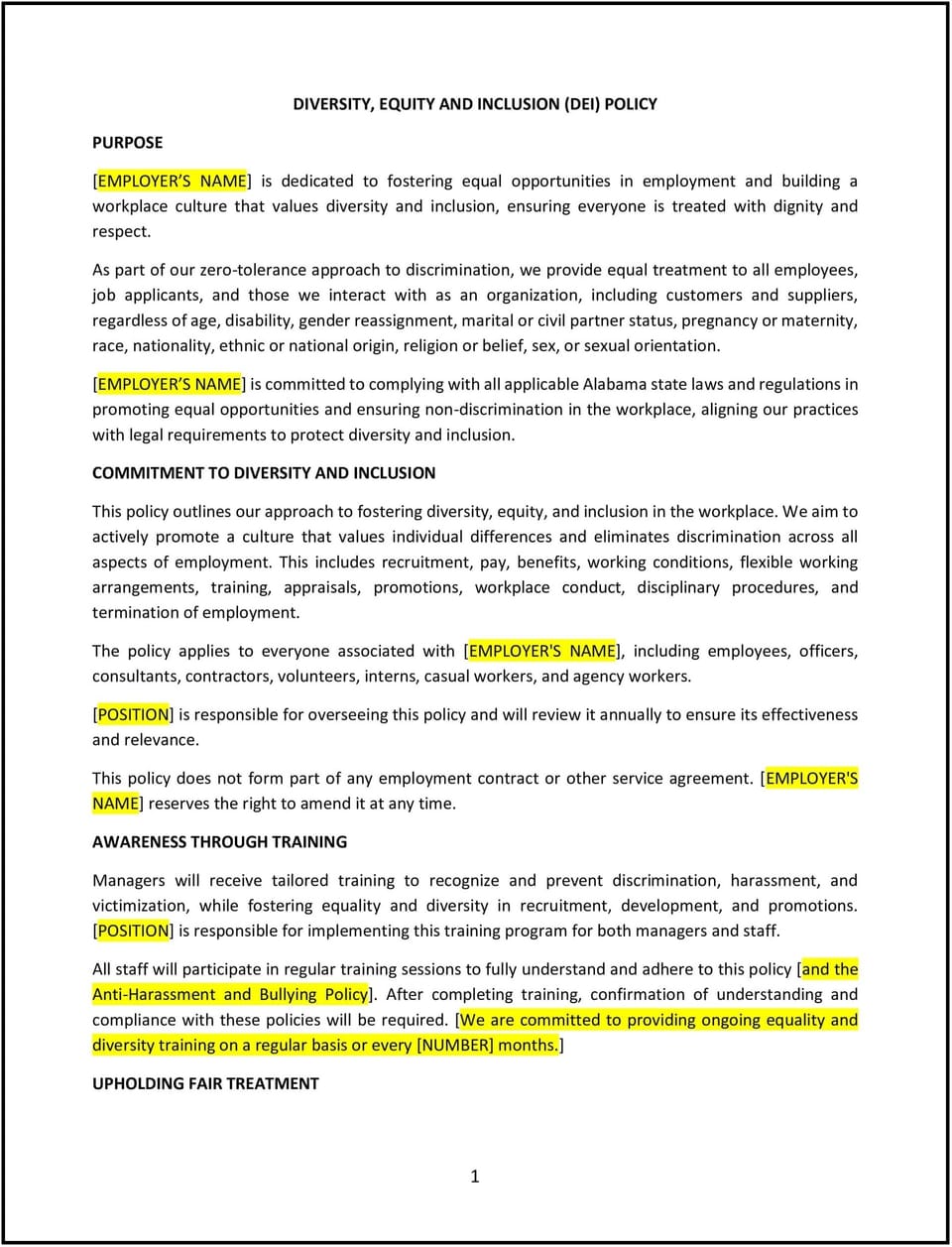Diversity, equity and inclusion (DEI) policy (Alabama): Free template

Diversity, equity and inclusion (DEI) policy (Alabama): Free template
Diversity, equity and inclusion (DEI) policy (Alabama)
A diversity, equity, and inclusion (DEI) policy outlines your commitment to creating a diverse, fair, and inclusive workplace. For SMBs in Alabama, implementing a DEI policy is critical for ensuring that employees from all backgrounds feel respected, valued, and supported. This policy helps your business align with Alabama’s legal standards, such as anti-discrimination laws, while also promoting a culture that welcomes diversity and encourages equal opportunities for all.
A well-executed DEI policy attracts a diverse talent pool, fosters employee engagement, and improves team performance by respecting individual differences and providing an environment where all employees can thrive.
How to use this diversity, equity and inclusion (DEI) policy (Alabama)
- Define diversity, equity, and inclusion: Clearly explain the meanings of diversity, equity, and inclusion in the context of your business. Diversity refers to the presence of differences in the workforce, equity ensures fairness in opportunities, and inclusion fosters a culture where all employees feel welcomed.
- Set goals and objectives: Establish clear goals for diversity, equity, and inclusion, such as increasing the diversity of your hiring pool or providing equitable opportunities for growth and advancement.
- Develop hiring practices: Ensure recruitment and hiring processes are inclusive, focusing on attracting candidates from diverse backgrounds and providing equal opportunities regardless of race, gender, sexual orientation, or other protected characteristics.
- Create inclusive practices: Detail actions to ensure all employees are included in decision-making, opportunities, and company culture. This could involve employee resource groups, inclusive communication strategies, or training on cultural competency.
- Establish accountability measures: Include mechanisms for monitoring DEI progress, such as regular reviews of hiring practices, employee surveys, and DEI-focused performance evaluations.
Benefits of using a diversity, equity and inclusion (DEI) policy (Alabama)
A strong DEI policy provides numerous benefits for both employees and the business. Here’s how it helps:
- Fosters a positive workplace culture: Promotes respect and understanding among employees from different backgrounds, creating a more collaborative and supportive work environment.
- Attracts top talent: A diverse and inclusive workplace is appealing to candidates from various backgrounds, expanding your talent pool and improving recruitment efforts.
- Enhances employee retention: Employees are more likely to stay with a company that values diversity, treats everyone equally, and fosters a sense of belonging.
- Improves business performance: Diverse teams bring varied perspectives that can lead to innovative solutions and better decision-making, improving the overall performance of the business.
- Reduces discrimination and bias: Implementing clear DEI policies helps mitigate the risks of discrimination or bias in hiring, promotions, and day-to-day operations, ensuring fairness and equity in the workplace.
Tips for implementing a diversity, equity and inclusion (DEI) policy (Alabama)
- Start with leadership commitment: Ensure senior leadership actively supports and models DEI values, setting an example for the rest of the organization.
- Integrate DEI into everyday practices: Incorporate DEI principles into all aspects of your business operations, from hiring and training to internal communications and performance reviews.
- Offer training and education: Provide ongoing DEI training for all employees, including unconscious bias training and education on cultural competency, to create a more inclusive environment.
- Create safe spaces for discussions: Encourage open dialogue around diversity and inclusion by setting up forums, focus groups, or employee resource groups where employees can share their thoughts and experiences.
- Measure progress and adjust: Regularly assess the effectiveness of your DEI initiatives through employee feedback, surveys, and tracking key metrics. Use this data to make adjustments and set new goals.
Q: Why is a DEI policy important for my business in Alabama?
A: A DEI policy helps your business comply with Alabama’s anti-discrimination laws, creates a positive work environment, and attracts diverse talent that enhances innovation and performance.
Q: What should I include in my DEI policy?
A: Your DEI policy should define diversity, equity, and inclusion, set specific goals, outline inclusive hiring practices, and include accountability measures for monitoring progress.
Q: How can I ensure DEI is practiced at all levels of the company?
A: Incorporate DEI into leadership, provide ongoing training for employees, and establish inclusive practices such as flexible work schedules, resource groups, and employee recognition programs.
Q: How do I measure the success of my DEI policy?
A: Track progress through employee surveys, monitoring recruitment and retention rates, evaluating promotions, and regularly reviewing whether DEI goals are being met.
Q: Is this policy required by Alabama law?
A: While Alabama law doesn’t require a DEI policy, adopting one helps your business comply with federal anti-discrimination laws and creates a fair and inclusive workplace.
Q: Can this policy help my company grow?
A: Yes, creating an inclusive workplace can attract top talent, improve employee morale, foster innovation, and enhance customer relations, leading to business growth.
This article contains general legal information and does not contain legal advice. Cobrief is not a law firm or a substitute for an attorney or law firm. The law is complex and changes often. For legal advice, please ask a lawyer.


